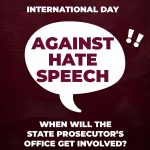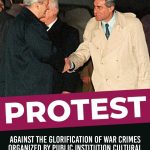
INTERNATIONAL DAY AGAINST HATE SPEECH – WHEN WILL THE STATE PROSECUTOR’S OFFICE GET INVOLVED?
18/06/2025
THE CONSTITUTION OR THE LAW OF MONTENEGRO STILL DO NOT APPLY TO THE JUDGES OF THE CONSTITUTIONAL COURT, NOR DO THEY RESPECT THE RECOMMENDATIONS OF THE VENICE COMMISSION
29/06/2025FOR RESPONSIBLE REMEMBRANCE – INITIATIVE TO REVOKE KARADŽIĆ’S AWARD

The non-governmental organizations Centre for Civic Education (CCE), Human Rights Action (HRA), Centre for Women’s and Peace Education ANIMA, the Association “Štrpci – Against Oblivion” and the Montenegrin Committee of Lawyers for Human Rights, together with civic activists Dina Bajramspahić, Jovana Marović, and Edin Smailović,submitted an initiative on Thursday, 26 June, to the public institution “Ratković Poetry Evenings” to revoke the “Risto Ratković” award for poetry given to Radovan Karadžić – the former president of the Bosnian Serb entity Republika Srpska and supreme commander of the Army of Republika Srpska, who was sentenced to life imprisonment for genocide, crimes against humanity, and violations of the laws and customs of war.
Subsequently, on 27 June, the Bosniak Party submitted a nearly identical initiative to the Municipal Assembly of Bijelo Polje, which we see as a confirmation of the importance of our initiative.
The “Risto Ratković” award was presented to Radovan Karadžić in 1993 in Bijelo Polje. At the time, the Montenegrin state leadership welcomed Karadžić during his visit to his native Montenegro, thereby effectively granting him political legitimacy for his role in the war in Bosnia and Herzegovina. That same year, passengers – civilians of Bosniak and Croat nationality and one unidentified person – were abducted and murdered from a train on the Belgrade-Bar line at the Štrpci station, which was then under the control of the Army of Republika Srpska. Of the 20 abducted and murdered passengers, only four have been identified and found. Among the victims of this war crime were citizens of Bijelo Polje, and in 2016 a memorial to the victims was unveiled in the town.
We recall that the United Nations Resolution on the International Day of Reflection and Commemoration of the Srebrenica Genocide, supported last year by Montenegro, unequivocally condemns the glorification of convicted war criminals, including those responsible for the genocide in Srebrenica. The resolution’s preamble explicitly references the conviction of Radovan Karadžić.
The work of Risto Ratković represents a significant contribution to 20th-century Montenegrin and Yugoslav literature, and Bijelo Polje rightfully takes pride in being the hometown of Risto Ratković (1903–1954). Poetry, literature, and art exist to connect people and cultures and to promote universal values. It is therefore unacceptable for the name of a great writer like Risto Ratković, along with the names of other poets from Montenegro and the region who have received this award, to be associated or placed in the same context as an individual responsible for genocide and crimes against humanity.
Marko Vešović, a poet from Bijelo Polje who spent the war in occupied Sarajevo and wrote extensively about the siege of the city by the Army of Republika Srpska (commanded by Karadžić), refused to accept the award in 2008 precisely because Karadžić had previously received it. At the time, Vešović stated: “They gave the award to a butcher who paused his massacre of Muslims, arrived with a division and a squadron of armored vehicles to receive an award at the Cultural Centre in Bijelo Polje – an encircled Cultural Centre – and afterward, no one said a word. I refuse to be part of that silence.”
Bijelo Polje, Risto Ratković, and Montenegro should not bear the burden of one man’s crimes. Therefore, the revocation of Radovan Karadžić’s award would represent an important step toward symbolic and moral distancing from those crimes, and a clear message that Montenegro does not forget and chooses the side of justice.
In the year that marks 30 years since the genocide in Srebrenica, we strongly urge the public institution “Ratković Poetry Evenings” to decide to revoke the award from Radovan Karadžić no later than July 11 – the Day of Remembrance for the Victims of Srebrenica.
We call on all actors in society – institutions, the academic community, civil society organizations, political parties, artists, and citizens – to support this initiative as an act of fundamental humanity, genuine European orientation, and responsible reckoning with the past. In doing so, Montenegro would set an example of responsible remembrance not only for the region but also for future generations.
Daliborka Uljarević, Centre for Civic Education (CCE)
Tea Gorjanc Prelević, Human Rights Action (HRA)
Ervina Dabižinović, Centre for Women’s and Peace Education ANIMA
Demir Ličina, Association “Štrpci Against Oblivion”
Velija Murić, Montenegrin Committee of Lawyers for Human Rights
Dina Bajramspahić, civic activist
Jovana Marović, civic activist
Edin Smailović, civic activist







 English
English